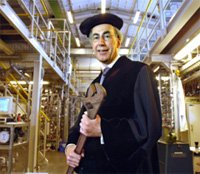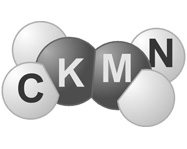| Spreker: | Rob van Veen |
| Datum: | 3 jun 2014 |
| Aanvang: | 20:00 uur |
| Locatie: | Kruytgebouw Universiteit Utrecht, zaal W728/729, Padualaan 8, Utrecht (Uithof) |
Samenvatting:
GTL, the abbreviation of gas-to-liquids, is a quite common notion today. However, at the start of the research and development programme that led to Shell’s GTL technology this concept was far from obvious. In the presentation the following items will be addressed: (i) the historical background, (ii) the rationale of Shell’s R&D in the area of synthetic fuels, (iii) how its course was affected by events in the world of oil during the seventies and eighties of the last century, (iv) how the originally envisaged coal-to-liquids process morphed into a gas-to-liquids one, based on the partial oxidation of methane to synthesis gas (CO/H2) followed by Fischer-Tropsch (FT) synthesis and hydroconversion of the FT product [the Shell Middle-Distillate Synthesis (SMDS)], and finally (v) how the SMDS concept was broadened into GTL. To date, the Shell GTL process has been implemented in Malaysia and Qatar.
Curriculum vitae Rob van Veen Rob van Veen (1948) is een anorganisch chemicus, en promoveerde in 1981 op een elektrokatalytisch onderwerp. In 1974 trad hij in dienst van het Koninklijke-Shell Laboratorium, Amsterdam, alwaar hij ook zijn hele werkzame leven heeft doorgebracht – afgezien van een (klein) jaar in Engeland (Thornton, bij Chester), 1982, en een jaar in Frankrijk (Grand-Couronne, bij Rouen), 1986-7. Belangrijkste thema’s in zijn werk: (i) directe methanol brandstofcel, (ii) structuur & reactiviteit van kolen, (iii) chemie van de katalysatorbereiding, (iv) [fundamenteel] onderzoek aan, en ontwikkeling & commercialisering van, diverse hydro-processing katalysatoren. Van 1986 tot 2006 was hij tevens deeltijdhoogleraar aan de TU/eindhoven. Sinds zijn pensionering in 2008 leeft hij o.a. zijn chemie-historische hobby uit.
Rob van Veen (1948) is een anorganisch chemicus, en promoveerde in 1981 op een elektrokatalytisch onderwerp. In 1974 trad hij in dienst van het Koninklijke-Shell Laboratorium, Amsterdam, alwaar hij ook zijn hele werkzame leven heeft doorgebracht – afgezien van een (klein) jaar in Engeland (Thornton, bij Chester), 1982, en een jaar in Frankrijk (Grand-Couronne, bij Rouen), 1986-7. Belangrijkste thema’s in zijn werk: (i) directe methanol brandstofcel, (ii) structuur & reactiviteit van kolen, (iii) chemie van de katalysatorbereiding, (iv) [fundamenteel] onderzoek aan, en ontwikkeling & commercialisering van, diverse hydro-processing katalysatoren. Van 1986 tot 2006 was hij tevens deeltijdhoogleraar aan de TU/eindhoven. Sinds zijn pensionering in 2008 leeft hij o.a. zijn chemie-historische hobby uit.

